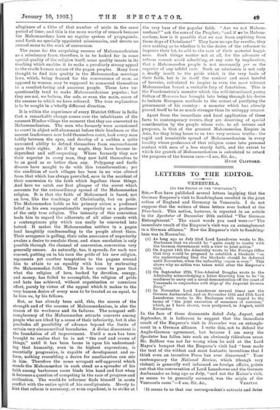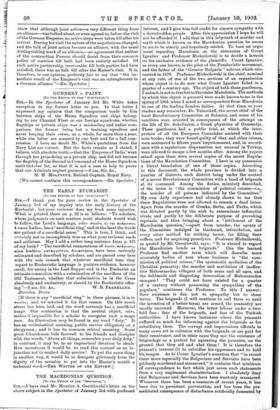LETTERS TO THE EDITOR.
VENEZUELA.
[TO THE EDITOR OF THE "SPECTATOR.")
SIR,— You have published several letters implying that the German Emperor's visit to Sandringham resulted in the joint action of England and Germany in Venezuela. I do not suppose that the writers of these letters ever looked at the Blue-book. This notion, however, is repeated in an article in the Spectator of December 20th entitled "The German Entanglement." The exact words you used were:—" The immediate result of the Emperor's visit was an entanglement in a German alliance." Now the Emperor's visit to Sandring- ham was in November.
(1) As long ago as July 23rd Lord Lansdowne wrote to Mr. Buchanan that we should be " quite ready to confer with the German Government with a view to joint action."
(2) On August 14th the Admiralty wrote to the Foreign Office that they would be prepared to establish a blockade " on the understanding that the blockade should be deferred until November, when the unhealthy season is over." This shows why no action was taken until after the Emperor's visit.
On September 27th Vice-Admiral Douglas wrote to the Admiralty acknowledging a letter directing him to be " in readiness to carry out a naval demonstration off the coast of Venezuela in conjunction with ships of the Imperial German Navy."
(4) In November Lord Lansdowne several times saw the German Ambassador, and on November 11th and 17th Lord Lansdowne wrote to Mr. Buchanan with regard to the terms of " the joint execution of measures of coercion," which, as I have shown, were postponed, in August, until November.
In the face of these documents dated July, August, and September, it is ludicrous to suggest that the immediate result of the Emperor's visit in November was an entangle- ment in a German alliance. I write this, not to defend the Anglo-German agreement, but because I am sorry the Spectator has fallen into such an obviously ridiculous error. Mr. Balfour was not far wrong when he said at the Lord Mayor's banquet that the Emperor's visit had "been made the text of the wildest and most fantastic inventions that I think even an inventive Press has ever discovered." Your contemporary the National Review, which (though very violent) is generally well informed on foreign affairs, points out that the conversation of Lord Lansdowne and the German Ambassador as long ago as July, "and not the Kaiser's visit, as seems to be generally assumed, was the origin of the Venezuela mess."—I am, Sir, &c., VERITAS.
fIt seems to us that our correspondent's extracts and dates
show that although joint action—a very different thing from an alliance—was talked about, or even agreed to, before the visit of the German Emperor, no active steps were taken till after his arrival. During his visit the nature of the negotiations changed, and the talk of joint action became an alliance, with the usual distinguishing mark of an alliance,—an agreement that neither of the contracting Powers should desist from their common policy of coercion till both had been entirely satisfied. Of such active partnership, irrevocable till both parties had been satisfied, there was no talk till after the Kaiser's visit. It is, therefore, in our opinion, perfectly fair to say that " the im- mediate result of the Emperor's visit was an entanglement in a German alliance."—ED. Spectator.]







































 Previous page
Previous page